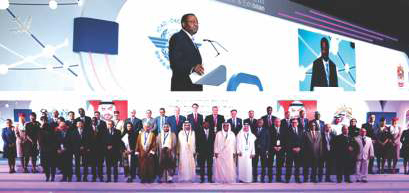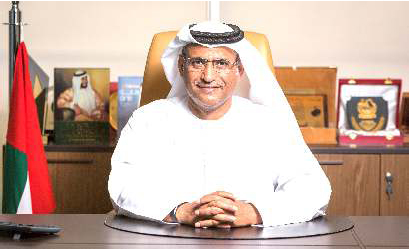Blockchain aviation potentials explored
First ICAO Blockchain Aviation Summit and Exhibition held in Abu Dhabi as industry mulls Blockchain Technology’s application on commercial aviation, cargo manifests, among others…
Aviation experts and professionals thoroughly discussed for three days in April the potentials of Blockchain on aviation which will strongly impact the movement of people and goods in the coming years.
The First ICAO Blockchain Summit and Exhibition was held on April 2-4, 2019 in Abu Dhabi, under the patronage of His Highness Sheikh Mohamed bin Zayed Al Nahyan, Crown Prince of Abu Dhabi and Deputy Supreme Commander of the UAE Armed Forces, co-sponsored by the UAE General Civil Aviation Authority, GCAA , and the International Civil Aviation Organization (ICAO). Some 800 delegates from 90 countries participated in the event.
Blockchain literally means just a chain of blocks which mixed with technology in today’s digital age meant distributed, decentralized ledger stored in a public database resistant to modification. Simplified, the records or transactions between the parties are referred to as “blocks” linked via cryptography with each block containing cryptographic hash of the previous block, a timestamp and transaction data, in an open or public databas e known as the “chain.”
Global air traffic volumes are anticipated to double within the next 15 years and increases in the number of aircraft and flights translate to increased ground, passenger, ticketing, and cargo handling activities, and a parallel expansion of the associated tracking , documentation, approval, and certification requirements, noted ICAO, a specialized body of the United Nations.
ICAO said the application of Block chain technology can be envisioned for almost all areas of the aviation system where complex and safety critical records are managed and updated, such as personnel licensing, aircraft maintenance, operational approvals, or cargo manifests and even traveler identity.
While offering many benefits, the integration of the technology would none the less present many challenges , and could cause fundamental changes in the structure of today’s aviation systems, experts agreed.
“The aviation system today relies mostly on human agent so r intermediaries to assume validation activities, and so we can foresee that the integration of block chain processes in support of a State’s aviation safety oversight system, for example, would likely require substantial adjustments to related regulations, procedures, a n d responsibilities,” explained Dr. O l u m u y i w a B e n a r d A l i u , ICAO Council President.
The ICAO official continued there are risks involved like cyber security, among others, but Blockchain is something that could also bring benefit to civil aviation customers and operators. The key, he said, is a strong collaboration between states and stakeholders to prevent any coordinated global cybersecurity threats against the civil aviation
industry.
“Blockchain has the potential to virtually exclude loss, distortion, or forgery of vital log data in all aviation sectors where certificates are issued and controlled,” Dr. Aliu said. “It can ensure the integrity of the ever growing certification-based system which is integral to aviation, with the potential to increase efficiency while reducing errors, and therefore, enhancing both safety and security.”
UAE and Aviation
Accounting for nearly 50 percent of the Arab aviation industry, the UAE continues to lead the region in commercial aviation and air freight sector with potential for more growth.
S a i f M o h a m m e d A l S u w a i d i ,
 Director-General of the UAE General Civil Aviation Authority (GCAA), said the estimated total investment in the UAE’s aviation sector amounts to AED1 trillion. This investment includes improvements to airport infrastructure and a fleet of 884 commercial aircraft, reflecting the UAE’s position as a significant competitor in the international aviation sector.
Director-General of the UAE General Civil Aviation Authority (GCAA), said the estimated total investment in the UAE’s aviation sector amounts to AED1 trillion. This investment includes improvements to airport infrastructure and a fleet of 884 commercial aircraft, reflecting the UAE’s position as a significant competitor in the international aviation sector.
Not resting on its laurels, the UAE is still aiming to increase its air traffic and airspace capacity by re-planning internal routes to extend t o neighboring countries as well as by introducing a new navigation management system by 2020 which is designed to generate annual financial savings of over AED50 million for airline companies.
At the summit, Al Suwaidi said tackling the potentials of Blockchain Technology is working towards a sustainable growth for the civil aviation industry without compromising security and safety.
 “This summit is a pivotal point towards the adoption of the Blockchain technology by the aviation sector that will help in overcoming the challenges that hinder the sustained development of this crucial sector. The level of participation we have witnessed in the event is a testimony to the commitment of the aviation industry towards a sustainable growth of the civil aviation system while maintaining security and safety worldwide,” Al Suwaidi said in his speech.
“This summit is a pivotal point towards the adoption of the Blockchain technology by the aviation sector that will help in overcoming the challenges that hinder the sustained development of this crucial sector. The level of participation we have witnessed in the event is a testimony to the commitment of the aviation industry towards a sustainable growth of the civil aviation system while maintaining security and safety worldwide,” Al Suwaidi said in his speech.
“Ensuring cooperation between government entities, the international aviation industry partners and the multitude of stakeholder is an important cornerstone in overcoming challenges. Today, the UAE is proving again its commitment towards promoting cross border cooperation, through the creation of interactive platform getting Blockchain gurus, the aviation industry and government agencies together to collaborate and share knowledge and information,” he added.
In 2018 , the aviation sector contributed 15 percent to the UAE GDP. GCAA recorded some 69,467 flight movements during the same period. Since the construction of UAE airports, more than 1.4 billion passengers had been served and the government anticipates that figure to rise to 2 billion in less than five years with aviation industry’s continued growth.
The UAE is hosting for the first time in the Middle East and North Africa Expo 2020 Dubai which is expected to draw as much as 25 million tourists during its 6-month duration— October 20, 2020 through April 10, 2021—where more than 190 countries are participating with the theme “Connecting Minds. Creating the future.”














